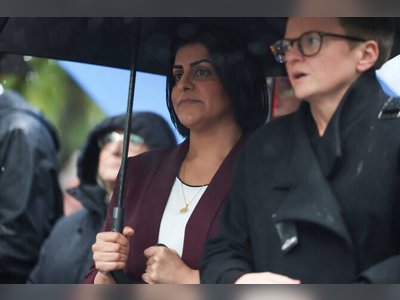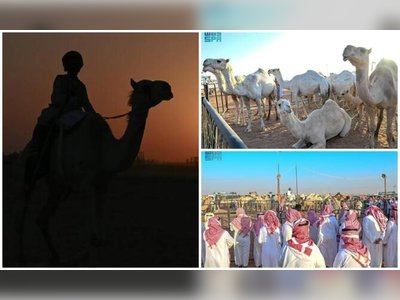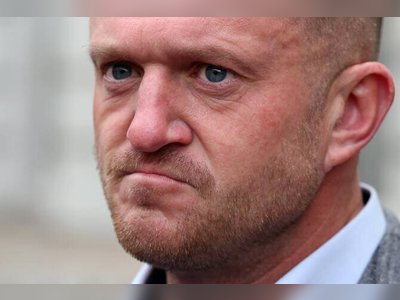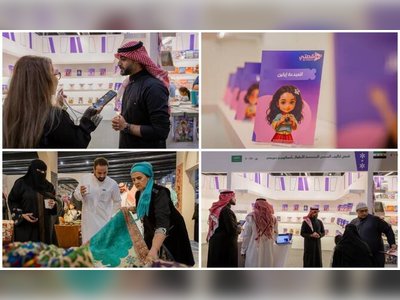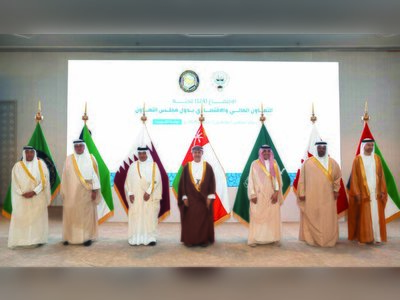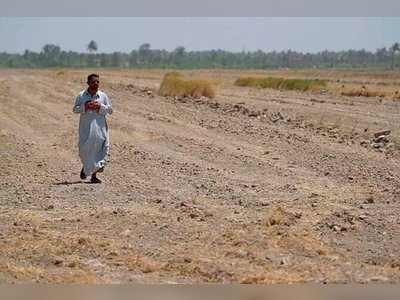
Riyadh's Cultural Investment Conference Highlights Saudi Arabia's Rising Creative Economy
The two-day event highlighted Saudi Arabia's efforts in positioning culture as an engine of growth under Vision 2030.
RIYADH: Saudi Arabia showcased the rising weight of its cultural economy this week as global leaders, investors, and creatives convened for the inaugural Cultural Investment Conference.
The two-day event, held Monday and Tuesday in Riyadh, highlighted how the Kingdom is positioning culture both as an engine of growth and a source of national pride under Vision 2030.
For Tarak Ben Ammar, chairman of Eagle Pictures, the significance was clear.
"First of all, it’s a historical moment.
There is no cultural investment conference in any country in the world that has ever happened.
So mixing culture and investment was a very smart vision by Prince Badr, His Excellency, His Highness.
And also because Saudi Arabia is now the leading country with its young population.
Remember, five years ago there were no cinemas in Saudi Arabia".
he said.
Ben Ammar, who has more than five decades of experience in the film industry, said he has witnessed the transformation of the sector in the Kingdom.
"The speed at which this young nation with a young population and their young leaders.
it shows you where you’re going as a country.
And if I can contribute and assist and help, as I would put [as] the elderly uncle to this country that I’ve known for 52 years I’ve been coming here.
I am now a Saudi resident.
So I speak like a Saudi citizen, and I’m very proud of that," he said.
He pointed to the Red Sea Film Festival and new content funds, noting his partnership with Sony and Empire to bring global titles and Arab filmmakers to Saudi audiences.
"You have a population of 38 million, 70 percent under 30, 700 theaters, freedom opened by His Royal Highness the Crown Prince, and the financial resources.
Those combinations will help raise young people to write, direct, and tell their stories," he said.
Andreas Gorgen, former Secretary General of Germany’s Federal Ministry of Culture and Media, said Saudi Arabia should design its own path.
"I think really the first lesson is don’t adopt a model — neither a French, neither an American, nor a German.
Develop your own, but have a careful look at what the others are doing and learn from their experiences, but also, and more importantly, learn from the errors," he said.
Gorgen added that culture delivers more than financial returns.
"Something very important in culture is to overcome social, racial, international divides and that needs investment into cultural infrastructure, which will never bring a return financially in the final instance, but a return on investment in social cohesion," he said.
Gorgen rejected framing culture as soft power.
"I’m not a friend of that concept of saying ‘it’s a soft power.’ The real idea of arts is to give access to humanity.
Humanity is a code.
it’s not a power question, it’s a question of becoming a human being," he said.
At the same time, he underlined the importance of branding.
"In order to play your role internationally, you have to develop your brand and you have to overcome the tensions.
So investing into international cooperation projects is very important for a country to become a brand, to display what it is doing, and also to give opportunities for the next generation," Gorgen added.
Saudi Arabia’s speed of change was another advantage.
"You don’t have 150 years of traditions to respect in cultural financing and in developing cultural sectors.
So your advantage is you go to the blossoming sectors in the 21st century," Görgen said.
Princess Nourah Al-Faisal, founder of Adhlal and Nuun Jewels, said the conference confirmed official backing for the creative economy.
"First of all, I’m very happy to be here and events like today are really important.
Our focus has always been on the development of the creative economy.
We believe absolutely that [for] diversification into different fields, the tool by which you do that is creativity," she said.
She noted the government’s readiness to collaborate.
"This type of event showcases.
that the government is ahead of the curve as usual.
They understand the potential.
They understand what is needed to develop.
And not only have they done that, but they’re making announcements today on how they’re going to do that moving forward," she said.
Adhlal is now working with universities to prepare students for careers.
"We’re really trying to upskill the students so that when they come out and they graduate, they already have the skills needed to enter into the market, whether it’s internships, mentorship, things like that.
Also, working with universities on special certifications, on extra diploma courses, anything that we can do to make them ready for the future, future entrepreneurs, future industries, that at the moment is our focus," she said.
She emphasized impact, stating that targets are always focused on how many jobs are created, how sustainable the businesses are that they work with, and how much Adhlal is giving back to the community.
"We will always, always be an entity that is focused on sustainability, focused on positive impact," she said.
Sultan Ghaznawi, chairman and managing director of Scene Holding, highlighted the private sector’s role in growing the cultural sphere in the Kingdom.
"The Cultural Investment Conference has set the scene for building a cultural destination for Saudis and non-Saudis, for investors who are interested in investing in the sector.
We have invested more than SR850 million ($227 million) in the cultural scene and our trajectory is to go and acquire more companies in the culture in order to consolidate the market and make a player that can truly fulfill the demands, the requirements of the Kingdom of Saudi Arabia," he said.
He added that Saudi growth will be linked to global events.
"The Kingdom is now on a trajectory that will enable cultural assets to deliver projects for everything from the World Cup, from the Expo, and it requires companies and private sector players to play a role that will hopefully deliver these projects to attract the demand that we expect to come to Saudi Arabia," he said.
For Lor Albrighi, co-CEO and founder of SPIN, technology is central to cultural change.
"Technology is kind of the underlying infrastructure that can enable transformation at scale worldwide.
What we’re trying to do is really build the physical and digital infrastructure, to build something that can actually connect the physical world to the digital world.
And using Web3 technologies like blockchain and AI and 3D twins," he said.
He pointed to the EU’s Digital Product Passport as an example.
"Any brand in the world that is selling a textile based product.
will have to be connecting every piece to a QR code or NFC chip, which the customer can actually tap on the phone, interact, and get all the information of authenticity, traceability, sustainability, and also ownership," he said.
Over two days in Riyadh, the Cultural Investment Conference showed how culture in Saudi Arabia is evolving from heritage and identity into an investable sector.
For participants, the message was that the Kingdom has the youth, infrastructure, and financial power to transform creativity into big business.
The two-day event, held Monday and Tuesday in Riyadh, highlighted how the Kingdom is positioning culture both as an engine of growth and a source of national pride under Vision 2030.
For Tarak Ben Ammar, chairman of Eagle Pictures, the significance was clear.
"First of all, it’s a historical moment.
There is no cultural investment conference in any country in the world that has ever happened.
So mixing culture and investment was a very smart vision by Prince Badr, His Excellency, His Highness.
And also because Saudi Arabia is now the leading country with its young population.
Remember, five years ago there were no cinemas in Saudi Arabia".
he said.
Ben Ammar, who has more than five decades of experience in the film industry, said he has witnessed the transformation of the sector in the Kingdom.
"The speed at which this young nation with a young population and their young leaders.
it shows you where you’re going as a country.
And if I can contribute and assist and help, as I would put [as] the elderly uncle to this country that I’ve known for 52 years I’ve been coming here.
I am now a Saudi resident.
So I speak like a Saudi citizen, and I’m very proud of that," he said.
He pointed to the Red Sea Film Festival and new content funds, noting his partnership with Sony and Empire to bring global titles and Arab filmmakers to Saudi audiences.
"You have a population of 38 million, 70 percent under 30, 700 theaters, freedom opened by His Royal Highness the Crown Prince, and the financial resources.
Those combinations will help raise young people to write, direct, and tell their stories," he said.
Andreas Gorgen, former Secretary General of Germany’s Federal Ministry of Culture and Media, said Saudi Arabia should design its own path.
"I think really the first lesson is don’t adopt a model — neither a French, neither an American, nor a German.
Develop your own, but have a careful look at what the others are doing and learn from their experiences, but also, and more importantly, learn from the errors," he said.
Gorgen added that culture delivers more than financial returns.
"Something very important in culture is to overcome social, racial, international divides and that needs investment into cultural infrastructure, which will never bring a return financially in the final instance, but a return on investment in social cohesion," he said.
Gorgen rejected framing culture as soft power.
"I’m not a friend of that concept of saying ‘it’s a soft power.’ The real idea of arts is to give access to humanity.
Humanity is a code.
it’s not a power question, it’s a question of becoming a human being," he said.
At the same time, he underlined the importance of branding.
"In order to play your role internationally, you have to develop your brand and you have to overcome the tensions.
So investing into international cooperation projects is very important for a country to become a brand, to display what it is doing, and also to give opportunities for the next generation," Gorgen added.
Saudi Arabia’s speed of change was another advantage.
"You don’t have 150 years of traditions to respect in cultural financing and in developing cultural sectors.
So your advantage is you go to the blossoming sectors in the 21st century," Görgen said.
Princess Nourah Al-Faisal, founder of Adhlal and Nuun Jewels, said the conference confirmed official backing for the creative economy.
"First of all, I’m very happy to be here and events like today are really important.
Our focus has always been on the development of the creative economy.
We believe absolutely that [for] diversification into different fields, the tool by which you do that is creativity," she said.
She noted the government’s readiness to collaborate.
"This type of event showcases.
that the government is ahead of the curve as usual.
They understand the potential.
They understand what is needed to develop.
And not only have they done that, but they’re making announcements today on how they’re going to do that moving forward," she said.
Adhlal is now working with universities to prepare students for careers.
"We’re really trying to upskill the students so that when they come out and they graduate, they already have the skills needed to enter into the market, whether it’s internships, mentorship, things like that.
Also, working with universities on special certifications, on extra diploma courses, anything that we can do to make them ready for the future, future entrepreneurs, future industries, that at the moment is our focus," she said.
She emphasized impact, stating that targets are always focused on how many jobs are created, how sustainable the businesses are that they work with, and how much Adhlal is giving back to the community.
"We will always, always be an entity that is focused on sustainability, focused on positive impact," she said.
Sultan Ghaznawi, chairman and managing director of Scene Holding, highlighted the private sector’s role in growing the cultural sphere in the Kingdom.
"The Cultural Investment Conference has set the scene for building a cultural destination for Saudis and non-Saudis, for investors who are interested in investing in the sector.
We have invested more than SR850 million ($227 million) in the cultural scene and our trajectory is to go and acquire more companies in the culture in order to consolidate the market and make a player that can truly fulfill the demands, the requirements of the Kingdom of Saudi Arabia," he said.
He added that Saudi growth will be linked to global events.
"The Kingdom is now on a trajectory that will enable cultural assets to deliver projects for everything from the World Cup, from the Expo, and it requires companies and private sector players to play a role that will hopefully deliver these projects to attract the demand that we expect to come to Saudi Arabia," he said.
For Lor Albrighi, co-CEO and founder of SPIN, technology is central to cultural change.
"Technology is kind of the underlying infrastructure that can enable transformation at scale worldwide.
What we’re trying to do is really build the physical and digital infrastructure, to build something that can actually connect the physical world to the digital world.
And using Web3 technologies like blockchain and AI and 3D twins," he said.
He pointed to the EU’s Digital Product Passport as an example.
"Any brand in the world that is selling a textile based product.
will have to be connecting every piece to a QR code or NFC chip, which the customer can actually tap on the phone, interact, and get all the information of authenticity, traceability, sustainability, and also ownership," he said.
Over two days in Riyadh, the Cultural Investment Conference showed how culture in Saudi Arabia is evolving from heritage and identity into an investable sector.
For participants, the message was that the Kingdom has the youth, infrastructure, and financial power to transform creativity into big business.
